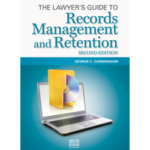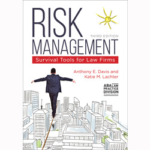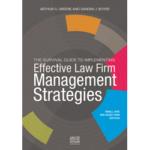The San Francisco Law Library maintains a comprehensive Law Practice Management Collection, with publications that detail all aspects of running a practice—client relations, billing, marketing, finances, risk management, technology, and more. This post gathers together the Law Library’s LPM resources on various management issues. Stay tuned for future installments that highlight the Law Library’s materials on additional LPM topics.
 The California Guide to Growing and Managing a Law Office. State Bar of California, 2012.
The California Guide to Growing and Managing a Law Office. State Bar of California, 2012.
This guide from the State Bar picks up where its popular predecessor, The California Guide to Opening and Managing a Law Office, left off, in recognition that law firms will not grow and thrive without sound management. Its first two chapters analyze management as three broad categories—managing resources, managing people, and managing oneself—as they address topics such as planning for growth with a strategic plan, avoiding the perfectionist trap, delegating, and giving constructive feedback. Subsequent chapters explore growth “dimensions”—financial, human, client, geographic, and technological—and sections on preparing for the unexpected and special topics like the science of influence round out this comprehensive management guide. With each chapter drafted by established practitioners and expert consultants, the collective wisdom contained in this book will help you face every law practice management challenge.
 The Lawyer’s Guide to Records Management and Retention, by George C. Cunningham. American Bar Association, Law Practice Management Section, 2nd ed., 2014.
The Lawyer’s Guide to Records Management and Retention, by George C. Cunningham. American Bar Association, Law Practice Management Section, 2nd ed., 2014.
Records management may seem like a rather dull topic, but it has ethical, client service, risk management, and cost control implications that must not be ignored. This book answers the essential questions of what records must be kept and for how long, of course, but it also explains records management on a more compelling level. For example, it discusses the nexus between proper records management and e-discovery, legal malpractice insurance, and work product and knowledge management. Whether you are shopping for a sophisticated enterprise system or you need to develop a simple indexing method to quickly retrieve documents by client or issue, this guide will show you how to save time and avoid aggravation by having your paper and electronic files in good order.
 Risk Management: Survival Tools for Law Firms, by Anthony E. Davis and Katie Lachter. American Bar Association, 3rd edition, 2015.
Risk Management: Survival Tools for Law Firms, by Anthony E. Davis and Katie Lachter. American Bar Association, 3rd edition, 2015.
Many lawyers erroneously assume that risk management only pertains to malpractice and ethics violations. In reality, risk is “anything that interferes with the ability of the firm and its lawyers to provide legal services and generate a profit from doing so.” This book emphasizes that effective risk management begins with a law firm culture that promotes risk awareness, oversight, and compliance. It does much more than merely provide self-assessment checklists—the authors explain each survey question to show how it fits into the bigger picture of risk management, covering everything from the firm’s management structure and financial controls, to technology and disaster recovery planning. The tools provided in this book will prove indispensable in guiding you through the process of evaluating and developing policies and procedures that will instill a strong risk management culture in your firm.
 Survival Guide to Implementing Effective Law Firm Management Strategies, by Arthur G. Greene and Sandra J. Boyer. American Bar Association, Law Practice Division, 2015.
Survival Guide to Implementing Effective Law Firm Management Strategies, by Arthur G. Greene and Sandra J. Boyer. American Bar Association, Law Practice Division, 2015.
This management guide analyzes a law firm’s goal of achieving success from a specific angle: “it’s all about the culture.” The authors posit that it is practically impossible for a firm to thrive without having a culture where each person is free from the distraction of a law firm’s internal strife and tension. But how do you shape culture? This book explains how to do it by developing effective leadership, confronting problematic behavior, and creating a clear vision for the firm. It goes on to analyze marketing, lawyer recruitment, finances, and many more topics through the all-important lens of culture. The result is a thorough exploration of how to build a positive environment and ensure success for your firm.
Andrea Woods is a Reference Librarian at the San Francisco Law Library.


